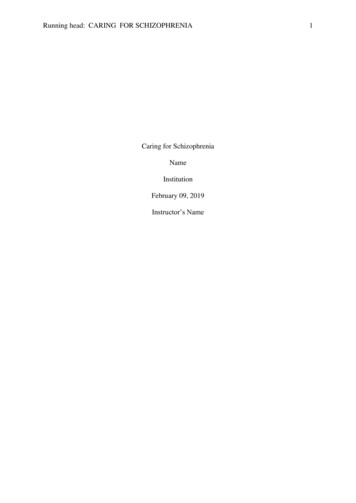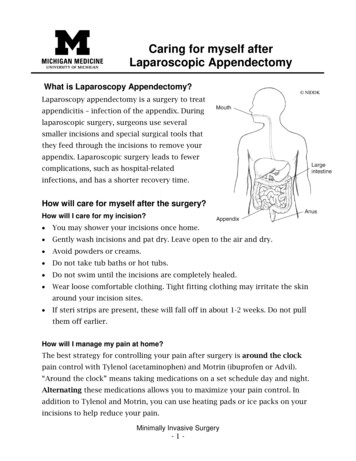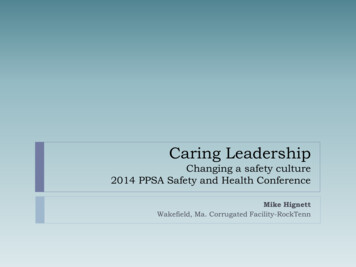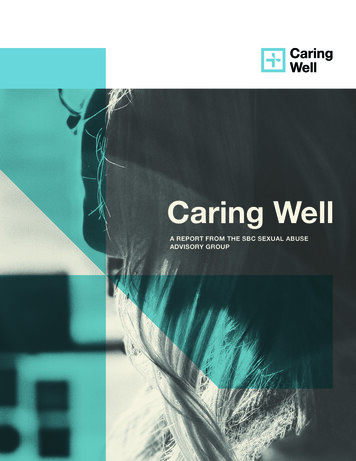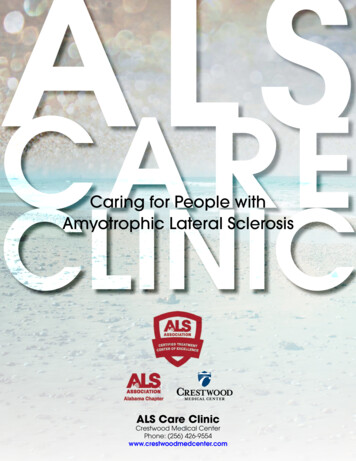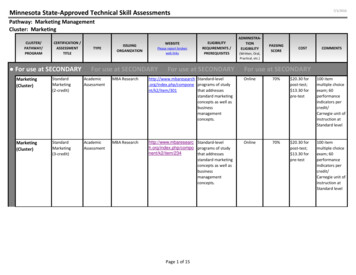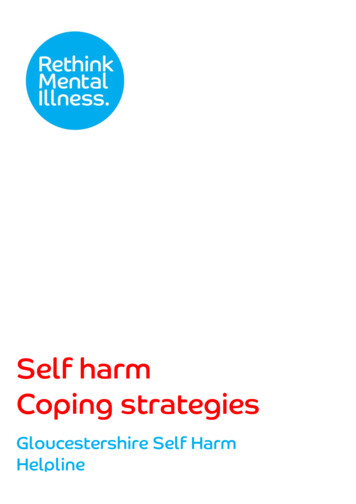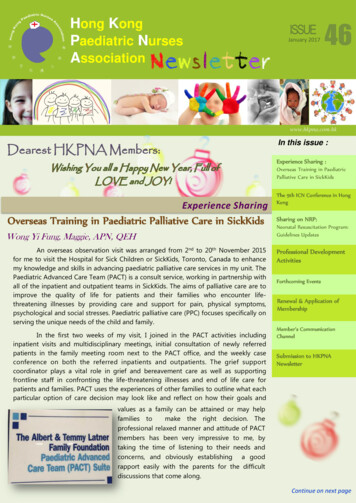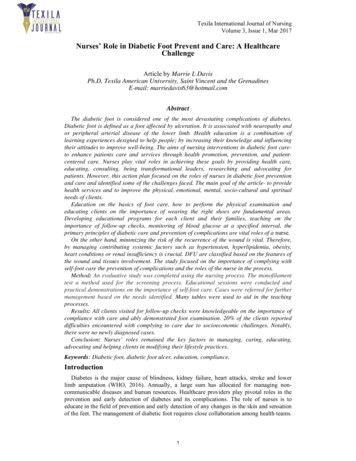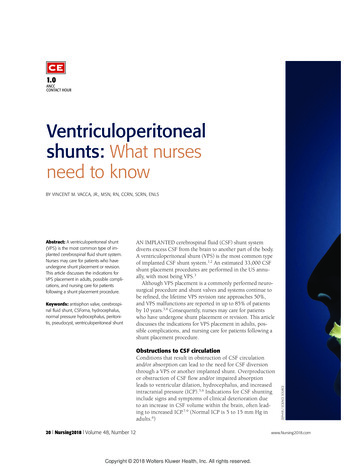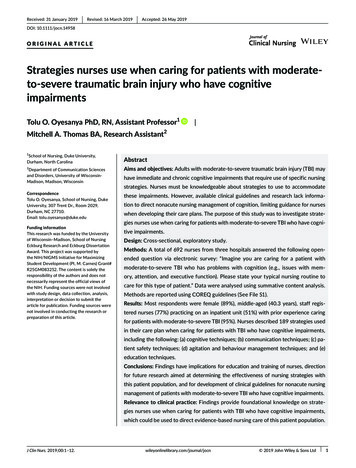
Transcription
Received: 31 January 2019 Revised: 16 March 2019 Accepted: 26 May 2019DOI: 10.1111/jocn.14958ORIGINAL ARTICLEStrategies nurses use when caring for patients with moderate‐to‐severe traumatic brain injury who have cognitiveimpairmentsTolu O. Oyesanya PhD, RN, Assistant Professor1Mitchell A. Thomas BA, Research Assistant1 2School of Nursing, Duke University,Durham, North CarolinaAbstract2Aims and objectives: Adults with moderate‐to‐severe traumatic brain injury (TBI) mayDepartment of Communication Sciencesand Disorders, University of Wisconsin‐Madison, Madison, WisconsinCorrespondenceTolu O. Oyesanya, School of Nursing, DukeUniversity, 307 Trent Dr., Room 2029,Durham, NC 27710.Email: tolu.oyesanya@duke.eduFunding informationThis research was funded by the Universityof Wisconsin–Madison, School of NursingEckburg Research and Eckburg DissertationAward. This project was supported bythe NIH/NIGMS Initiative for MaximizingStudent Development (PI, M. Carnes) Grant#R25GM083252. The content is solely theresponsibility of the authors and does notnecessarily represent the official views ofthe NIH. Funding sources were not involvedwith study design, data collection, analysis,interpretation or decision to submit thearticle for publication. Funding sources werenot involved in conducting the research orpreparation of this article.have immediate and chronic cognitive impairments that require use of specific nursingstrategies. Nurses must be knowledgeable about strategies to use to accommodatethese impairments. However, available clinical guidelines and research lack informa‐tion to direct nonacute nursing management of cognition, limiting guidance for nurseswhen developing their care plans. The purpose of this study was to investigate strate‐gies nurses use when caring for patients with moderate‐to‐severe TBI who have cogni‐tive impairments.Design: Cross‐sectional, exploratory study.Methods: A total of 692 nurses from three hospitals answered the following open‐ended question via electronic survey: “Imagine you are caring for a patient withmoderate‐to‐severe TBI who has problems with cognition (e.g., issues with mem‐ory, attention, and executive function). Please state your typical nursing routine tocare for this type of patient.” Data were analysed using summative content analysis.Methods are reported using COREQ guidelines (See File S1).Results: Most respondents were female (89%), middle‐aged (40.3 years), staff regis‐tered nurses (77%) practicing on an inpatient unit (51%) with prior experience caringfor patients with moderate‐to‐severe TBI (95%). Nurses described 189 strategies usedin their care plan when caring for patients with TBI who have cognitive impairments,including the following: (a) cognitive techniques; (b) communication techniques; (c) pa‐tient safety techniques; (d) agitation and behaviour management techniques; and (e)education techniques.Conclusions: Findings have implications for education and training of nurses, directionfor future research aimed at determining the effectiveness of nursing strategies withthis patient population, and for development of clinical guidelines for nonacute nursingmanagement of patients with moderate‐to‐severe TBI who have cognitive impairments.Relevance to clinical practice: Findings provide foundational knowledge on strate‐gies nurses use when caring for patients with TBI who have cognitive impairments,which could be used to direct evidence‐based nursing care of this patient population.J Clin Nurs. 2019;00:1–12.wileyonlinelibrary.com/journal/jocn 2019 John Wiley & Sons Ltd 1
2 OYESANYA and THOMASKEYWORDScare plan, cognitive impairments, nursing, strategies, traumatic brain injury1 I NTRO D U C TI O NTraumatic brain injury (TBI), particularly TBIs that are moderate or se‐vere in nature, may cause adult patients to have immediate and chroniccognitive impairments that influence strategies nurses when caringfor these patients. Available research and nursing and interdiscipli‐nary TBI clinical guidelines lack information to direct nonacute nursingmanagement of cognition, which limits guidance for nurses to use indeveloping their care plans. To address these gaps in knowledge, thepurpose of this study was to investigate strategies nurses use in theircare plans when caring for adult patients with moderate‐to‐severeTBI who have cognitive impairments. Findings have implications foreducation and training of nursing who care for these patients, futureresearch aimed at determining the effectiveness of nursing strategieswith this patient population, as well as development of TBI clinicalguidelines to direct nonacute nursing management of patients withmoderate‐to‐severe TBI who have cognitive impairments.What does this paper contribute to the wider globalclinical community? We sampled 692 nurses at three hospitals in the UnitedStates on the strategies used in their care plans whenproviding care to adult patients with moderate‐to‐se‐vere TBI who have cognitive impairments. Findings show nurses use 189 strategies spread across5 major categories, including cognitive, communication,patient safety, agitation and behaviour management,and education techniques. Findings have implications for education and trainingof nurses, direction for future research aimed at deter‐mining the effectiveness of nursing strategies with thispatient population, and for development of TBI clinicalguidelines for nonacute nursing management of pa‐tients with moderate‐to‐severe TBI who have cognitiveimpairments.2 BAC KG RO U N DGlobally, more than 69 million people sustain a TBI each year (Dewanoften report headaches and problems with vision, hearing, motoret al., 2018), and 2.7 million of these individuals reside in the Unitedskills, balance and fatigue (Reddy et al., 2017).States (Centers for Disease Control & Prevention, 2017). TBI is de‐The above‐listed impairments have major negative effects on adultfined as “a bump, blow or jolt to the head or a penetrating head injurypatients’ lives, including chronic problems with employment, relation‐that disrupts the normal function of the brain” (Centers for Diseaseships, independence and healthcare management (Jaglal et al., 2014).Control & Prevention, 2017). TBI can be characterised as mild, mod‐The full recovery trajectory is highly variable, and prognosis and re‐erate, or severe, with neurological injury severity being defined bysidual effects are difficult to predict (Kothari, 2007; Maas, Marmarou,indicators such as Glasgow Coma Scale Score, length of loss of con‐Murray, Teasdale, & Steyerberg, 2007). As TBI incidence rates are highsciousness, and presence and length of post‐traumatic amnesia (PTA)for young adults (Centers for Disease Control & Prevention, 2017),(Teasdale et al., 2014). Adults who sustain a moderate‐to‐severe TBImany survivors live with the residual effects of the injury over theirrequire immediate hospitalisation for critical care and rehabilitationlifespan (Corrigan & Hammond, 2013). When seeking care unrelatedand typically have multiple impairments in cognition, behaviour, com‐to the TBI later in life, the presence of these residual impairmentsmunication, emotion and physical functioning (Babikian & Asarnow,requires that nurses revise their care plans to meet patient needs2009). Patients who have cognitive impairments may experience(Oyesanya, Brown, & Turkstra, 2016; Oyesanya & Snedden, 2018).problems with memory, attention, executive functioning, comprehen‐Nurses play a multi‐faceted role in the care of adult patients withsion and processing speed (Babikian & Asarnow, 2009). Impairmentsmoderate‐to‐severe TBI throughout the hospital stay, with numerousin behaviour can manifest as agitation, aggression, impulsivity androles and varying responsibilities as interdisciplinary team membershypo‐/hyper‐activity (Reddy, Rajeswaran, Devi, & Kandavel, 2017).(LeCroy & McMahon, 2015; McNett & Gianakis, 2010). A nurse mustAs behaviour involves cognition, cognitive and behavioural problems(a) assess patient needs, (b) monitor and maintain the patient's con‐often occur together (Reddy et al., 2017). Communication impair‐dition, (c) coordinate the patient's care, (d) communicate with otherments may include difficulties with word finding, expressing oneself,interdisciplinary providers about the patient's condition, (e) provideunderstanding what others are saying or picking up on verbal and non‐nursing care, (f) prevent further injury, (g) integrate therapy recom‐verbal cues (McDonald, Code, & Togher, 2016). Similar to behaviour,mendations in the nursing care plan, (h) educate the patient and family,communication involves cognition, so many impairments in cognition(i) provide emotional support to the patient and family and (j) advo‐and communication co‐occur (McDonald et al., 2016). Common emo‐cate for the patient (Long, Kneafsey, Ryan, & Berry, 2002; McNetttional impairments include anxiety, depression, irritability, motivation& Gianakis, 2010; Villanueva, 1999). The choice of nursing strategiesand personality changes. Finally, patients with physical impairmentsinterventions (i.e., the characteristics of the intervention) is solely
OYESANYA and THOMASbased on the patient's current condition and the patient's and family'scurrent needs, which requires that nurses revise their care plans on aregular basis (LeCroy & McMahon, 2015). In particular, addressing the33.2 Ethical considerationsWe obtained approval from the participating institutional reviewpatient's immediate and residual cognitive impairments caused by theboards, including approval for a waiver of written consent (Lentz,TBI may require the most revisions to the nursing care plan (Oyesanya,Kennett, Perlmutter, & Forrest, 2016). The first page of the surveyThomas, Brown, & Turkstra, 2016). These cognitive impairments in‐listed the study information sheet, containing information about thefluence the patient's healthcare experience, such as provider–patientstudy team, purpose and activities, as well as risk and benefits ofcommunication, (i.e., the patient's ability to converse with and com‐participating. Participants were notified that their participation wasprehend information from the provider) and the patient's ability to re‐voluntary, confidential and anonymous and that completion of theceive and retain educational information (Babikian & Asarnow, 2009).survey implied consent to participate in the study.Given the high prevalence of cognitive impairments among in‐dividuals with TBI (Babikian & Asarnow, 2009; Reddy et al., 2017),adapting care plans to accommodate cognitive limitations is partic‐3.3 Sampleularly important for nursing care; however, there is a dearth of liter‐We recruited nurses from three large hospitals in the Midwest: oneature on strategies nurses use when caring for adult patients withhospital within a large academic medical centre hospital and twomoderate‐to‐severe TBI who have cognitive impairments. Similar toVeterans’ hospitals. Nurses were eligible to be in this study if theythe limited research on this topic, there are gaps in evidence‐basedwere employed by one of the participating hospitals.clinical guidelines for nursing management of adult patients with mod‐erate‐to‐severe TBI who have cognitive impairments. While there arenursing (American Association of Neuroscience Nurses, 2008) and3.4 Data collectioninterdisciplinary clinical guidelines on care of persons with moderate‐Data were collected electronically through a purposive sample.to‐severe TBI (Carney, Totten, & O’Reilly, C., Ullman, J. S., Hawryluk,Hospital administrators sent an email to all nurses employed by theirG. W., Bell, M. J., Kissoon, N., 2017; Department of Veterans Affairs,facilities (n 3,904) inviting them to participate by clicking a web link2013; Joint Trauma System, 2017), few sufficiently inform nonacuteto complete an electronic survey. Within the email, nurses were no‐nursing care and management of patients with moderate‐to‐severetified that a nurse researcher was conducting a study to learn moreTBI who have cognitive impairments. In addition, limited researchabout nursing care of patients with TBI and that their participationhas been conducted to determine whether nurses adhere to avail‐was voluntary, confidential and anonymous.able clinical guidelines; however, interdisciplinary research has shownWe asked nurses to anonymously answer the following open‐variations in provider adherence to TBI clinical guidelines (Brolliar etended question: “Imagine you are caring for a patient with moder‐al., 2016). The lack of clinical guidelines to inform nursing care andate‐to‐severe TBI who has problems with cognition (e.g., issues withmanagement of this patient population suggests nurses may not havememory, attention, and executive function). Please state your typi‐necessary information to guide development of care plans for patientscal nursing routine to care for this type of patient.” The open‐endedwith moderate‐to‐severe TBI who have cognitive impairments.question was pilot tested with the nursing practice council of a par‐As evidence‐based care is the standard for nursing care (Melnykticipating hospital before use. Nurses typed their responses into a& Fineout‐Overholt, 2011), this study seeks to address the lack oftext box that had no limit on the number of words or characters. Weresearch and evidence‐based clinical guidelines for nurses to use toalso asked nurses to answer demographic questions, including thedirect development of their care plans when caring for patients withfollowing: age, sex, highest nursing degree, years of active nursingmoderate‐to‐severe TBI who have cognitive impairments. Our aimpractice, years at current position, primary role, primary work set‐was to shed light on the topic in an effort to direct future researchting, age of patients seen and prior experience caring for patientsfocused on identifying and testing effective nursing interventions forwith TBI.this patient population, which is
1School of Nursing, Duke University, Durham, North Carolina 2Department of Communication Sciences and Disorders, University of Wisconsin‐ Madison, Madison, Wisconsin Correspondence Tolu O. Oyesanya, School of Nursing, Duke University, 307 Trent Dr., Room 2029, Durham, NC 27710. Email: tolu.oyesanya@duke.edu Funding information
